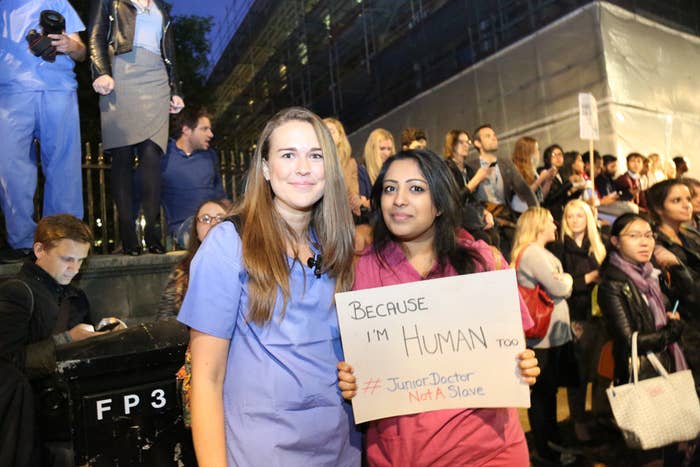Women have said that they stand to be more deeply affected than their male counterparts if proposed changes to the junior doctors' contract go ahead.

The new junior doctors' contract proposed by health secretary Jeremy Hunt could see "sociable working hours" for which junior doctors are paid a standard rate change from 7am-7pm Monday-Friday to 7am-10pm Monday-Saturday.
It would also remove incremental pay rises, with increases instead based on moving through the stages of training and taking on more responsibility.
Doctors have said that the contract also removes safeguards that mean hospitals can be penalised for overworking juniors.
Some female junior doctors believe these changes could disproportionately affect them. BuzzFeed News spoke to them about their concerns.
1. Removal of incremental pay rises could widen the gender pay-gap.
Under the current contract, all doctors in training are given an incremental pay increase every year, including doctors who train less than full time (LTFT). So even if doctors take longer to complete their training, pay still increases in line with years worked.
The new contract would mean that pay rises would be determined by regular reviews of performance and development, meaning that doctors training LTFT would take longer to reach the same pay grade as full-time training counterparts.
According to the Medical Women's Federation, the majority of doctors training less than full time are women, which would mean that more women "might be on the same pay grade for several years despite gaining competency, further widening the gender pay gap recognised in medicine".
"The proposed new model of tiered, incremental pay (three tiers throughout training) would mean that I would have no increase in pay for six years," Bernadette Lomas, a 34-year-old junior doctor training in anaesthesia, who is currently taking her second maternity leave, told BuzzFeed News. Worse, she said, is that "progression through the tiers would depend on a review at the point that I complete a full-time equivalent year: If this fell outside the annual review period for trainees, I could be waiting more than six years."
Another junior doctor, who preferred not to be named, began training in August 2010 and has since taken three and a half years to complete a PhD. She said that she is now thinking of starting a family, returning to work as a LTFT trainee, and continuing her research, which would further extend her training time. She said that with this in mind, "It is likely that I will not start to work at the next level of training [at which point she would be eligible for a pay increase] until at least the end of 2017; over seven years without a pay rise, and hopefully with extra mouths to feed, bodies to clothe, and heads to maintain a roof over."
"I certainly feel the conflict between pursuing the dream of becoming a surgeon and becoming a mother," junior doctor Amy Lindh told us. "There is no doubt in my mind that the new contract will make it more difficult to pursue the latter, and it would come at the cost of the former."
#NHSselfie whilst you sleep, we work...Sweet dreams, Jeremy!
2. Junior doctors' pay would no longer be protected if they choose to take maternity leave.
The British Medical Association said it has been recommended that trainees' pay should no longer be protected if they choose to take time out to have a baby or to retrain in a new specialty.
"This would have considerable impact on women doctors who would be concerned about planning a family," the Medical Women's Federation said. "This may discourage women from continuing in medicine as a career, leading to further staff shortages affecting patient care, and recruitment and retention issues across the NHS."
Taking time out to train means that doctors can "improve the care that we can give to patients and their families," one female junior doctor said. They added that under the new contract, however, it also means a "real-terms pay cut for each year spent in a particular training level." So anyone who chooses to take time out to train and to start a family, which in reality is mostly women, stands to be doubly penalised financially.
She expressed concern that "you can foresee a situation where the career decisions made by junior doctors who plan to start families could change considerably, for example delaying child bearing until consultancy, and risking age-related sub-fertility".
Lindh noted that while men do have the option of paternity leave, "it is for a maximum of 26 weeks, and only paid if the mother is not taking maternity leave pay. I would estimate that financially there are not many cases where this would make sense." She added: "The physical impact of childbirth and pregnancy is being massively overlooked. Maternity leave, even for 12 weeks post-partum, should be incentivised."
Claiming in The Guardian that the new contract discriminates unfairly against women, junior doctor Sarah el-Sheikha said: "Some may be forced to sacrifice their career in order to settle down; ultimately, this [is] most likely to be female trainees."
Junior doctor Nina Beck told BuzzFeed News that the removal of protection of pay for women who take maternity leave would be a U-turn on "decades of positive change to support the role of women in a traditionally male field".

3. Reduced protection on break times could be harmful to pregnant doctors.
Under the current contract, doctors are entitled to a 30-minute break for every four hours worked, (although junior doctors BuzzFeed News has spoken to have said that this often doesn't end up happening even now). According to the BMA, the new contract removes a banding system that penalises employers for overworking trainees, and would allow break times to be reduced to 20 minutes every six hours.
This has raised concern among the medical community over the effect that overworked doctors could have on patient safety. Describing existing conditions when doctors work on-call shifts, Dr Sundeep Grewal told us that "everyone knows you'll look and feel like a zombie and that the second half of the week is when you'll make most mistakes."
The removal of these safeguards around shift breaks, Dr Andrew Hartle, president of the Association of Anaesthetists of Great Britain and Ireland, has said, would be especially detrimental to doctors working during pregnancy.

4. The change in "sociable working hours" would be especially challenging for those managing childcare responsibilities.
One doctor BuzzFeed News spoke to, who preferred not to be named, pointed out that "many junior doctors relocate across the country in order to train in the speciality they feel they are most suited to, which means that often they are living away from their wider families who may be able to assist them with childcare.
"If there is no one to look after your child(ren) in the evenings or at weekends whilst you are at work, or if you have to pay exorbitant childcare costs (e.g. antisocial hours rates paid to childminders/babysitters) does it make financial sense/is it possible to continue working?" she said.
"My husband, who is also a doctor, and I already work 13-hour days and nights over the weekend," Lomas told us. "But the combination of having Saturdays counted as 'sociable working hours' and the government's plans to increase 'seven-day' working will mean that we work even more weekends.
"I'm sure anyone will appreciate that childcare is virtually non-existent over the weekend unless you have good friends or family nearby."
The Medical Womens' Federation also felt that the extension of "sociable" working hours "does not take into account the importance of work-life balance and the need for family time".
Stereotypes are meant to be broken #ilooklikeasurgeon #womeninsurgery plus worked oncall all weekend #ImInWorkJeremy
"It could be argued that this should not affect women more than men: Men can choose to be LTFT and can share maternity leave, and of course these changes will affect those who choose this work pattern equally," Lomas told us.
But, she recognised, "We do live in the real world, and as more women train LTFT and take the majority of maternity leave, these changes will affect women disproportionately.
"If these changes go through there will be families, particularly where the woman is the main breadwinner, or those who have two medical parents who will find their hours changes unsustainable. The double whammy of pay loss will definitely mean more women leave medicine."
In a letter to Jeremy Hunt, royal medical colleges expressed concern that changes to the junior doctors' contract would have a huge impact on the recruitment of doctors overall, and in a letter to the British Medical Journal, the Association of Surgeons in Training said they would have a "devastating effect on the retention of women within surgical training" in particular.
"I have colleagues who currently work LTFT and are concerned that their wages in the proposed system might not be sufficient to make returning to work financially possible or sensible," one junior doctor told us, which "potentially further depletes an already overstretched junior doctor workforce."
Lomas added: "Women in medicine do have a tougher time and the advances that have been made in gender equality have been hard won over a generation. The imposition of these changes risks undoing all that good work at one fell swoop."
